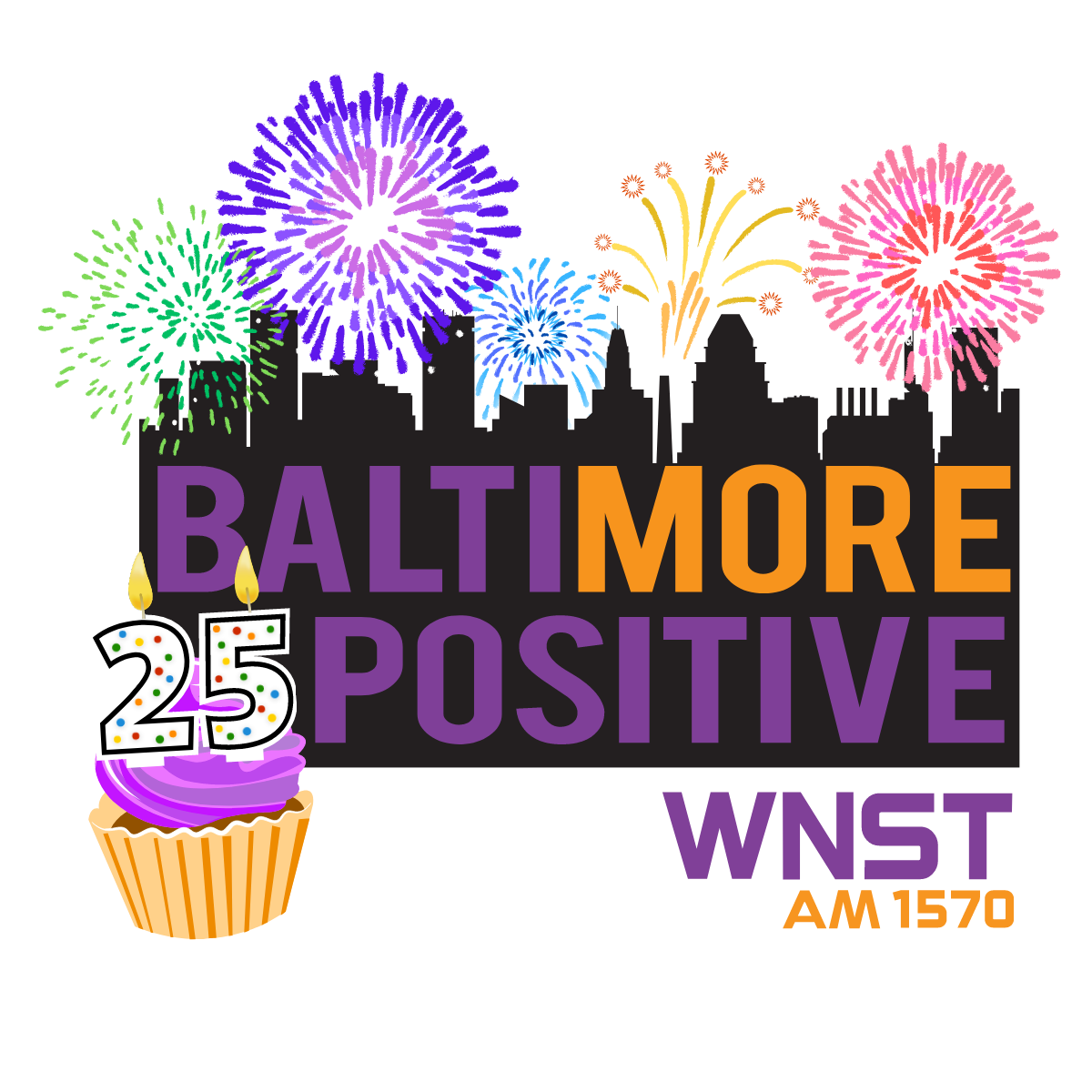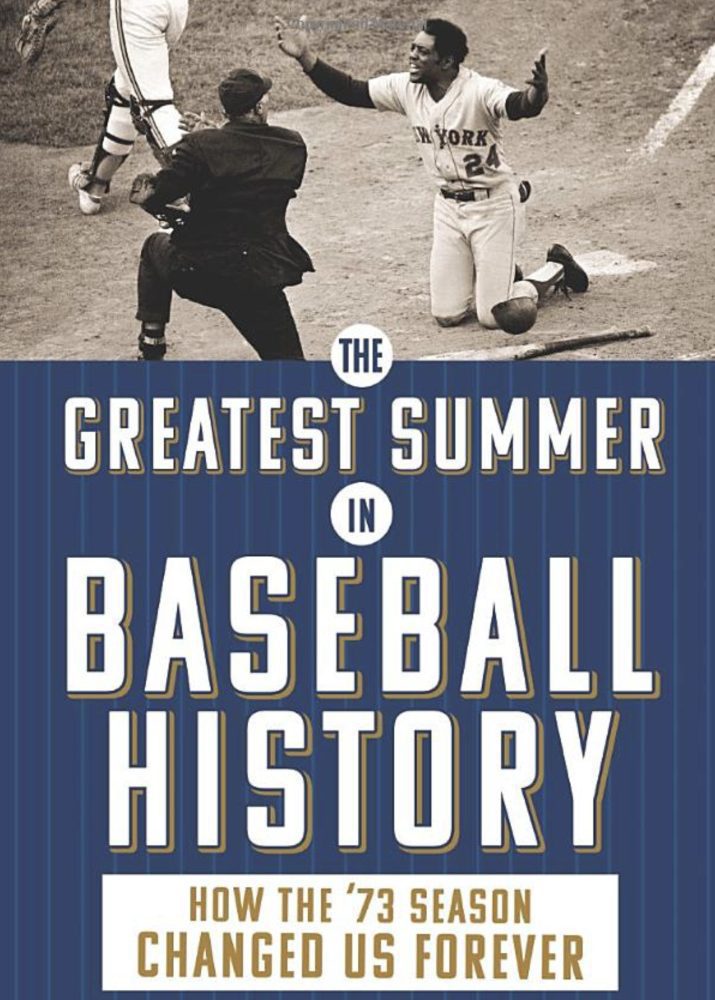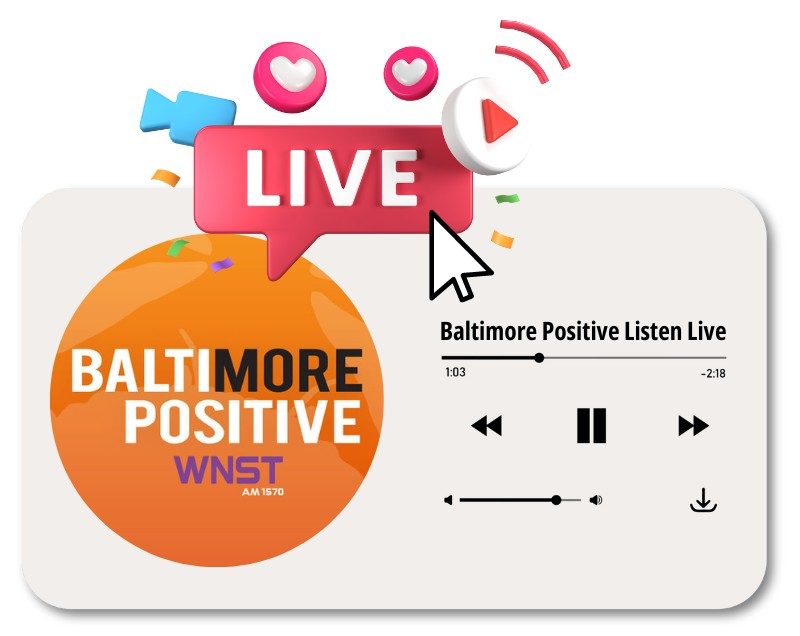Author John Rosengren takes Nestor back to baseball in 1973 with his new book on a special season for Major League Baseball, the designated hitter and memories to last a lifetime.
SUMMARY KEYWORDS
baseball, pitching, game, players, years, season, book, dad, gave, dh, reggie jackson, baltimore, nolan ryan, era, talking, career, designated hitter, pitchers, john, yankees
SPEAKERS
John Rosengren, Nestor Aparicio
Nestor Aparicio 00:01
Welcome back at W N S, T, Towson, Baltimore and Baltimore positive we are positively getting the Maryland crabcake tour back out on the road just in time for baseball season and I’m wearing my fade Lee’s gear because we’re going to be down to fade Lee’s on the seventh, which is the day after opening data home opening day because we open on the road. And also that week we’re going to be on the fifth over with our friends at cost is celebrating 50 years of the Maryland lottery it’s 50th anniversary, I have some instant lottery scratch offs to give away also our friends at when donation 866 90 nation call while you can you get two by two you get two free 24 Month 0% financing with our friends at window nation. And for our friends and families. I just wanted to throw this out. We’re gonna be doing that though, morning of the Springsteen show that opens the new arena. And then the Eagles are in on Saturday. So it’s a whole downtown thing. We’ll be talking about downtown the old lights in the market the new lights in the market, just to remind you can stop by failings on the way the ballpark get the best crabcakes going delicious beer, three blocks away from Camden Yards, come on downtown and do it. This one is really after my heart. I honestly, um, y’all know my baseball thing for 31 years and season starts. And a lot of the writers have changed, although I’m expecting Bob Ryan and Dan Shaughnessy to show up here this week as we play the Red Sox and some of my Yankees friends. But I’m always looking for good baseball conversations to have and honest ones about the history of the game. And this one kind of came to me fell over it has written a book about the 1973 season. Now that’s interesting to me for a lot of reasons, not just because it’s 50 years ago, and I was one of the guys that dumped the DH bumper stickers back in 1991 when this whole journey started on the radio, but so many things sort of my first year that I remember baseball, I was four years old, going to be five, my cousins playing for the Red Sox. I was a baseball fan and all of that stuff. So this guy has some Show and Tell about his book. I have some show and tell about the 1973 baseball season that I had fetched out of my attic of baseball tropes. You know, John, they put the bunting out. And I get crazy about opening day and the Orioles like had a chance this year, which is very, very rare since I hit puberty. John Rosengrant is here. His book is now out you can buy it he’ll be holding it up. I actually they gave me a PDF and that’s good for me. But John, I gotta tell you, man, page 202. There’s a picture of Luis Aparicio. In Orlando. So beta. So the greatest summer in baseball history, and I’ve heard that about 6768. Around here, we think it’s 83 or 70 or 66. But I know you’re a big 73 fan. So well. Welcome a man. Let’s talk some baseball my friend.
John Rosengren 02:45
Hey, Nestor. Thanks for having me on. I appreciate it. Well, uh, books and 73
Nestor Aparicio 02:49
I don’t know how old you were in 73. I’ve already given away that I was born. I was born during I was born four days after the 68 world series ended, which was during the riots in Detroit. 1968. So I’m, you know, I was a war torn baby to begin with, but in 73 I remember Ross the stop I remember the playoffs. The Oakland A’s were the first team I ever hated. And I’ve admitted that a whole lot. You’re wearing that ace had that had Reggie Jackson Sal bando can’t be can’t Oh, no, fingers on cat fish, Vita, blue, blue, Moon Odom all the guys that my dad hated and taught me how to hate. But 73 was really special to me the baseball cards of 73 and 74 and 75 in the minis were special to me. Why 73? For you?
John Rosengren 03:38
A good question there. Two reasons one, to reference the age. I hit that sweet spot in 1973 between the time when a kid learns how to read a box score and discovers dating, and so the time was magical for me right then that’s I think the golden era of sports in any kid’s life was grows up.
Nestor Aparicio 03:59
I say to this in 31 years, I’ve been saying this on the air. Baseball was the greatest thing in the world till I discovered girls. And I’m talking like Charlie’s Angels, Cheryl Teague, you know, right around that, you know, it was right around this go right around all of that. So yes, I changed me, Raquel Welch’s passing me the wrong way as well. So yes, right.
John Rosengren 04:19
But until then, it seems that sports captivates our attention and our imagination. And we’re in that young period of our lives where we dream and our imaginations are vivid. And so it’s a magical time to follow sports. I turned nine, the summer of 1973. And so it was right in that sweet spot for me, as I said, and then I was looking, I knew I wanted to write a book about a year in the history of baseball, and I was looking for one that had significance both in the nations profile, but also in the game itself. And I think I found in 1973 I mean, we had the US signed the Paris Peace Accords and started pulling out of Vietnam. There is the oil shortage and gas was hard to come by Watergate was unraveling and Nixon was tap dancing around that the Watergate hearings and begun. And so it was this time well, the American Indian Movement had taken over Wounded Knee so Marlon Brando refused his Oscar.
Nestor Aparicio 05:19
The Padres were trying to move to Washington and they printed baseball cards in the spring screwed that all up. Right.
John Rosengren 05:26
Right. And then with baseball season, your cousin had a new teammate in Orlando Cepeda who was the first man hired as a designated hitter. The American League had embarked on this three year experiment starting in 1973, with the what Charlie Finley called the permanent pinch hitter. And then George Steinbrenner bought the Yankees and so there’s this infusion of money into the game. The Hank Aaron was trying to catch Babe Ruth and his Fabled 714 career homerun mark, and did that in the with all sorts of racist resistance in the country, which reflected the times of course, I mean, the most popular TV show at the time was all in the family with Archie Bunker bunker, America’s favorite they get. And then we had the Mets in the A’s going after it in the World Series. And Willie Mays, who had been traded late in his career to the 72, to the, from the Giants to the Mets, was that in the last legs of his career, and Reggie Jackson was up and coming with the, the A’s it was his first World Series. And there was this passing of the torch of superstars and Reggie Jackson, really, you know, Willie Mays, I think define the superstar of his era. And Reggie Jackson redefine the superstar with a chest thumping, ego maniac, hype talking player who could actually back that up. And so it was a transformative time in the game, I would maintain that it’s never been the same. There’s kind of a pre 73 era and a post 73 era
Nestor Aparicio 06:59
in the era and dead ball that begat the designated hitter. And then of course, 73 with free agency right there. I mean, Messersmith, you’re right on the precipice of all of that that was about to happen. Where the Oreo away was about, let’s get Don Baylor, let’s get Bobby Grich let’s get out the Sensei, let’s get all the guys that would later go play for the California Angels. Right. Or the New York Yankees. You know, all of that was moving in. When I think of 73 You know, my dad took me to those playoff games in 73 and 74. Specifically 74 with cat fish and chip Palmer. I remember that game. I still have my scorecard from that era and those games, but 73 There were there were the incidents with Pete Rose and and Harrelson. Right, and there was there was also rusty Stob was a great, great, great player, you know, leaving Montreal, but coming to the Mets. I mean, he was on the other side of the 69. Mets, right that was going that the Mets really were going to challenge the Yankees, right? The Mets started as a joke, but they this second time they’d been in the World Series and the Yankees were in the outhouse literally at that point, right? The Yankees were a mess.
John Rosengren 08:16
Yeah, the Yankees have gone into decline when CVS bought them. And they their glory days were looked like they might be over. And, you know, you talked about the change in well, the free agency actually, the context for that was there’d been a strike in 1972 that shortened the season. And then in 73, there was another lockout had spring training, because the players and the owners were working out the basic agreement, which spelled out things like minimum wage and Wilter, shares, et cetera.
Nestor Aparicio 08:47
Well, the designated hitter got them jobs, right. It gave us the pay to Tommy Davis gave gave jobs to players and has for 50 years literally, right.
John Rosengren 08:58
Right. What Martinez career was that when there was these labor disputes, and it soured the fans. And so attendance was down particularly in the American League. And so that set the stage for free agency, the big gain in 1973 was arbitration where the players could name a salary figure that they thought that they deserved management name to figure they thought that that was fair. And then an arbitrator picked one and went with it. So it gave the players negotiating power leverage in their contract negotiations, which was new. And yes, the DH rule did give players like Orlando Cepeda a chance to extend their careers he had retired at the age that actually released him in 72. He thought his career was done.
Nestor Aparicio 09:41
How many Hall of Famers Frank Robinson, at that point was at the age right,
John Rosengren 09:45
exactly right. Tony Oliva Riccardi were some of the big names back then big boy
Nestor Aparicio 09:49
that people you mentioned Rico Carty. Yeah, any Shetty show I do a RICO cardies mentioned any of the protagonists of seasons in hell, my favorite pet A small book, by the way, which also, by the way, was of that era, right?
John Rosengren 10:05
Yeah. Right. So anyway, that that the DH, as I mentioned, the rule was offered as an experiment for three years, but it was so successful in bringing fans in the, through the turnstiles that after the end of the season, the owners decided, let’s go with this, we’ll make it a permanent thing. And then of course, it only took the National League net 49 years to catch up. Last year,
Nestor Aparicio 10:28
baseball moves at a glacial pace, the greatest summer in baseball history out of 73 season changed us forever. Hold the book up John Rosengrant, here from my ministry to say something about that book that tells me so when did it come out? Give me a little background on this while you hold that up.
John Rosengren 10:45
Okay, so this came out in actually, the original book was this book in 19 or two? Let’s see. It’s so hard for
Nestor Aparicio 10:55
me to Cameron, Hank, George Almighty and say, Hey, kid, all right. Yeah.
John Rosengren 10:59
So this came out in 2008. So 15 years ago, and the it had one of the worst titles in history of a book publishing industry. And so I was able to convince the publisher to reissue it this year on the 50th anniversary of the 73. Season with new cover new title. And so here it is. We picked that the photo of Willie Mays without arguing the car that wasn’t one buddy house and crossed the plate in the World Series and he got tagged. Well, Ray Fauci claims you take them on the Jersey, but it looks for all intents and purposes like he got in safely. And Willie Mays was arguing the case there. Yogi Berra later came out and was arguing with them, but when he talked about the Mets The interesting thing about their season 73 was they were actually in last place on August 30. So it looked like their season was basically over like baseball. This wasn’t doing anything in New York that summer. But they managed to rally when the division when the division series against the reds, I was Woody Harrelson and Rose had their little dust up at second base. And then they, you know, took the A’s to seven games. I won’t. I don’t want to give the spoiler on that one. But
Nestor Aparicio 12:17
are you an ace fan? Are you a twins fan?
John Rosengren 12:20
Well, I grew up a twins fan. But in researching this book, I became the A’s were this irascible group of guys. They’re like these lovable rascals, I think and yeah, easy to hate, but also looking back on them and seeing all the foibles and what they went through with their owner, Charlie Finley, you know how he would meddle with the game with the team had caught I tell the manager who was going to pitch he tried to get him to shave and then they wouldn’t so he went the other way. And he had, you know, encouraged them all to grow mustaches. But the players, they fought among themselves, but we’re united by a hate a common hate a Finley. So it was just such an intriguing team that I the history of them. The A’s is what I like,
Nestor Aparicio 13:05
oh, I mean, great books have been written on Charlie Finley in recent times. And we’ve had those authors on and I am a sucker for the mid 70s John Rosengren is here and talking baseball and sort of the roots of my baseball so I got some I got show Mattel you had your book. So I went and found this because I had thought about this. And you know, I can share the picture. Let me find the picture on my Facebook because I I was fully not prepared for this. But at least for our audience out there that I can find this picture in 1973 at the end of the year, you can look it up in the in late early September. My dad took me out to meet Luis Aparicio and get a baseball gentleman’s share this right off my facebook page here. The man on the right with the bread cap with the sea for Colgate my pop. That’s Luis obviously little guy. There’s me with the baseball and the really sharp looking sweater. But But more than that, John, I still have the baseball and the baseball is actually signed by the 1973 Red Sox. And you can see Aparicio signature very prominently, you know, in black. All the other ones were in, like blue and they sort of faded. But I think about the 73 Red Sox baseball, all right, yeah, just Sremski bisq gian, Sepulveda, Cecil Cooper’s on the ball, Petra, Sally’s on the ball. I know I’m missing another hall of famer. I gave you Yaz fist there was some debate is on the ball, right. Rick Miller I’m just trying to think other players of that era. But just up Fred Lynn and Jim rice were not on the ball. Although they were both of that era. The next year, they would come in and Burleson and Lombardi QEz and those players Diego ciggies. autographs on this ball, Dick pol dick pic All these autographs on this ball, so, so like as a kid, the 73 season the me’s very magical. And I think when you write about it the DH more than anything that year, I don’t remember baseball before the DH now we all do because they played the National League style in the National League for 49 more years, right. But I think the DH thing and my dad’s thoughts about it as growing up in Baltimore, where it was sold and embraced by Frank cash and and Earl Weaver, and, you know, we had Lee Mae after that, and then in the 70s, it was so controversially weird, and my dad grew up Scranton, Pennsylvania. My dad was born in 1919. Like, that’s all Babe Ruth play, right? So my dad was old school, but my dad, like embraced at the age as a Baltimore guys, we rode the bus at the Memorial Stadium in the 70s. And my dad liked it from a strict strategic standpoint, believe it or not, my dad was 55 years old at the time, but my dad liked the DH, that it became something and that season, when you say change the game of baseball, never the same again in the American League, for sure.
John Rosengren 16:10
Right. It’s interesting, you mentioned Carl yastrzemski, because he was one of the guys who spoke out against the DH didn’t want it to happen. And His concern was, if the pitchers didn’t have to bat, they wouldn’t have to face retribution for throwing at batters on the other team,
Nestor Aparicio 16:24
like Don Drysdale as an example. Well, yeah.
John Rosengren 16:27
Drysdale of course, but it because he was pitching the National League, but plenty of it out of reputation. Were throwing at players. I mean, that was part of baseball’s code. But they knew then if they had to, they had come back the bad they could face the same thing. And so there was actually a study done several years later, it’s called the moral hazard if you can engage in risky behavior without danger of consequence. And they said that it did show like in the I think it was 20 years or so after the DHT was impact, instituted, that there’s an 11 to 17% greater chance that players will get hit. Well, there was that not the retribution. It didn’t stop Pedro
Nestor Aparicio 17:11
but it helped Pedro when he got to the American League.
John Rosengren 17:15
They do Martinez Yeah,
Nestor Aparicio 17:17
well, just the guys of that era that would switch leagues and wouldn’t have to bat anymore and it could change their ability to be aggressive or more aggressive. Of course that didn’t stop the bench clearing brawls John Rosa grunts here he’s written about the 1973 baseball season open goodbyes book so your connection to baseball these days I you know I know you’re in the Minnesota area. I had Rod Carew on I did my show on Radio wrote Super Bowl number of years ago and his heart is of course donated from a former Raven whom I knew in Conrad rule on and I think about the twin story and Elisa and Harmon Killebrew, I have another baseball signed by the killer. My dad took me 74, maybe 75 down to the Babe Ruth Museum, the Babe Ruth bathe birthplace. The first time I was ever there was to meet Harmon Killebrew. So you know, I have an affinity for all things that were Mall of America, and where there used to be a stadium here, like the Sinatra song and all that, that I would think your childhood with the twins included some really dog as cold baseball in April and May out there.
John Rosengren 18:23
It did, and then also some hot baseball on July and August, but you’re right, those were the names I grew up with. And Rod crew was my hero. As a kid. I used to argue with my dad, who was a Ted Williams fan, who was the greatest hitter of all time. And he would say, Williams, I said, karo but that’s only because, you know, as I said, I was it was that magical time when crew made an impression on
Nestor Aparicio 18:44
me. My dad were there with you as he would he would yell about unusual but my dad loved Ted Williams mean, Ted, I had the science of hitting Yeah, my dad was a nine blocks all that right. Yeah.
John Rosengren 18:55
And I’m now that I’m older, I’m willing to concede the argument Williams could hit with power crew couldn’t so Williams was the better dinner.
Nestor Aparicio 19:01
I got my Tony Quinn, Jersey over here. Don’t get me started on my buddy, Tony. Now,
John Rosengren 19:05
I was just in San Diego yesterday and they’re drinking 394 beer there. You know, because that’s his season high average. And so there’s a brewery 394
Nestor Aparicio 19:16
Don’t give me one more reason to go to San Diego. I only
John Rosengren 19:20
don’t go today. It’s raining hard. Another storm coming through Pierce, chico. I’ll tell you it. They have great memories of going to the mat and of course, they tore out a piece of my heart when they knocked on that stadium and built a shopping mall. And you can still go see there’s a bronze replica of home plate in the center of the mall where there’s an amusement park, but it’s just so sad. And I remember talking to Harmon Killebrew they have a chair up on the wall of that that central area the amusement park, which was where the longest home run, hit met stadium had landed, and that was of course harm killed was and I asked him what what you know, tell me about that. homerun how far to go? And he said, well, it must have been 800 feet. And he said the long the older I get the longer I went. But he was such a gentleman and a good guy. And it was sad. Of course, he ended his career in Kansas City. So we lost him but Tony Oliva was a guy whose career was extended by the the DH rule, you know, he would not be in the Hall of Fame today. I don’t think if the DH rule hadn’t come along because he would have had to retire because of his bad knees. He could no longer play the field. Hey, been a marvelous fielder. But he was obviously known for his hitting three time Silver Slugger award winner and just a great, great athlete until his knees gave out on but anyway, so though I you know, as you I have such fond memories of being a boy and going to the game and going to watch the game and so that’s why I think I still that doesn’t go away that flame doesn’t extinguished. And so I still enjoy watching the game. You know, even with the rule changes. This year, I think the heart of the game will be the same and you’ll still have that matchup bat, you know, pitcher batter and wondering who’s going to win and how and so I’m looking forward to another season with that the sunshine and the green grass. I mean, to me, that’s just an irresistible feeling to be out there on the watching the game. As the Twilight sets in, you know, in the shadows get long grass gets golden under the sunlight. I mean, nowhere else I’d rather be
Nestor Aparicio 21:20
well, you know, for modern fans, and I think about a couple of places like Atlanta where they play baseball now in three different places. You guys have played in three different places. We’re now don’t cough John, but it’s 32 years since Camden Yards kind of was erected. And we’re working on a lease in the year the old man’s kids you know, got his national boots on and you know, all that’s as you’re wearing an ace hat, they don’t have anywhere to play. You know, I’ve been going out there for years. And I love going to the dump out in Oakland because it’s the only thing left like Memorial Stadium. It’s the last stadium is sort of smells like it looks like it the bathrooms, the brick all of it. And Memorial Stadium has been gone almost 30 years now 25 years. And I my wife would tell you it took me 15 years to drive down 33rd Street because it would just break my heart to not even see the stanchions coming up over the trees as you pull into the neighborhood my mana Bella so, I mean, there is something deeply deeply I think as we get older, not symbolic, but just even. It’s it’s part of our life and certainly part of the culture of any any city where there was a major league baseball team, you know, and if you have those memories of doing that, I’m assuming you have a, you know, a homer hanky somewhere there, but more that you mentioned Blyleven and Blyleven has always pissed me off because he went to Pittsburgh. And then after that he becoming here every year do my show. He would make me wear his pirates World Series ring and sing we are family to me, and taught me but blood level is one of my all time I mean, did he ever circle you or anything like that? I mean, Bert Burt’s a legend in Minnesota. Right?
John Rosengren 22:59
Right. Yeah. Well, he figures in my book and then 1973 book, he was the twins. Here’s this picture, who at 22. He pitched in the All Star game and took the loss, unfortunately, was terribly nervous walk the first two guys. But yeah, I’ve been to fantasy camp with Bert Blyleven and talked to him over the years. We actually talked about doing a book together at one point. And what attracted me to him was his stories of practical jokes. I mean, he would crawl in Seattle under the bleachers, all the way out to the bullpen in centerfield to set someone’s shoe laces on fire. And the guy just had a great sense of humor, and was raised. Yeah, exactly. So yeah, he comes figures out in this book, but it wasn’t till 87 When I think he won the World Series with the twins that he was, you know, bigger player here in town? Well,
Nestor Aparicio 23:55
no doubt my dad knew about the curveball. And, you know, in the mid 70s, essentially, for all the good teams, and I was a little boy, and my dad worked at the steel mill, and he would go out, you know, my pop, I showed you the picture, we’d go out to games, and he loved baseball, but we were picky about when we would go and my dad’s thing in the 70s was always who’s pitching. What’s the pitching matchup and it was never about do we really want to see Palmer or Quasar McNally. Or, you know, Steven, Steve stone later Flanagan those guys. It was more about hey, when the angels come in what nights Nolan Ryan pitch and witnessed Anana pitch and when’s Blyleven pitching? When is split off pitching? When is Dennis Leonard pitching when is you know, at any event, any of the star? We’re local people so musasa pitch for the for the Brewers, and he’s a Baltimore kid, we would want to go see him, but my dad would always do all of that. Oh, sorry, pitching. Where are you on modern era on all of this? Because we’ve had the pleasure of listening to Jim Palmer pitch for 30 years, not only about really lousy baseball, lousy ownership here, but more than that, About lamenting not just the guys don’t go complete games and innings and, and how many, you know, pitch counts and all of that. But just the fact that the game has changed dramatically from a pitching standpoint, and I don’t even know what it means for gambling. They’re trying to ram the gambling down our throats, you’re gonna bet on baseball. I mean, already, you’re 31 years I’ve yet to meet that degenerate gambler for baseball that bet on starting pitching, but you can’t even do that anymore, really? Because it’s not that it’s viewed differently. The Sport views all of its assets so differently in a way that we haven’t mentioned analytics yet in 50 years, but boy is it changed the game.
John Rosengren 25:36
Right? Well, Jim Ballmer had something to pitch about in 1973. He was, would go on to win the Cy Young Award that year, but he was left off the all star team by Dick Williams, the manager who was managing the A’s at the time. And Nolan Ryan actually figures in the story in 73. Because he was, he was added to the all star team, but only after boy can intervene because Williams had left Nolan Ryan off the team as well. Even though Nolan Ryan had pitched to no hitters already in the 73 season. By the time the all star game was played in July. And so we’d let Ryan on and of course that season 1973 was when Nolan Ryan broke Sandy Koufax single season record for strikeouts. He notched 383 Best in Colfax by one. And what I think is significant about that record is that Ryan wasn’t pitching against pitchers. In other words, he had to face a designated hitter instead of a pitcher, which was kind of an automatic out, and probably would have had at least 20, more strikeouts, maybe 40 More strikeouts if he’d face pitchers during the season. And so that was another that was kind of a launchpad. I think for Nolan Ryan’s career that 73 season, and I hold him up as the greatest of all time in terms of being able to throw hard, you know, as hard as today’s pitchers, and being able to pitch complete games, and throwing seven no hitters and a bunch of near misses. And so I am nostalgic in the sense of I miss, when guys would go the whole game. As a point of pride. I recognize that guys are throwing harder today in that it makes more sense to nurse their arms and to limit their pitch counts. And and there’s, you know, the reliever and the specialty relievers have really altered the game. But it adds a little more strategy as well. So I don’t complain about that. Obviously, it’s lengthen the game with all the pitching changes. But back in 73, the games were two and a half hours. And that’s been held up today as the standard, we want to get back two and a half hours. But in 1973, they thought that was too long, because they’d been two hours, you know, about 20 years prior. So, you know, people always find something to complain about. And the game, of course will evolve. But there’s still always that. Oh, and the other thing, the shift, you know, people are complaining about the ship this year with a team’s can’t do the shift. I liked the shift as a strategic implementation. I wish that the batter’s would respond by bumping against it or learning the hit to the opposite field. I know that’s hard when guys throwing 102 miles an hour, or has really nasty stuff. You don’t want off the island, John. Right. But I mean, right crew is the button for 30 hits a year, you know, and so I go watch in a batting practice. He’d lay out a towel, you know, on the infield, and he practice bunting during batting practice. He lay balls down and that towel was his target and he’d hit it. By the way I
Nestor Aparicio 28:32
thought about this. I think there shouldn’t be some 388 beer in the Twin Cities. That’s what I say. Yeah, because I grew it right 3d now. Yeah,
John Rosengren 28:40
that was a magical season. 1977. But just one last thing. I mean, it you know, obviously we’ve mentioned Ted Williams teams were employing the shift against him and it worked. And Hank Aaron in 1973, they were managers were employing the shift against him. He had a bad back and he had had to adjust his swing so he could no longer hit to the opposite field. Everything he hit was the left field. But that so managers employed the shift and his manager figured took Dell Matthews figured it taken about 30 points off of Aaron’s advanced average because he couldn’t beat the shift. But you know, it’s so this wasn’t a new recent invention. It’s been employed much more frequently over the last decade. But it’s you know, the these things have been around and you know, smart move to shift your infield and paint cans up. You know, he’s only gonna hit the left field.
Nestor Aparicio 29:32
Nike 73 Season feature. You mentioned that all star game at the Royal stadium. You know, you got me Google and stuff and get my own memories together about things. You mentioned Hank Aaron, I was bragging on the fact that I saw Hank play in 75. As a member of the Milwaukee Brewers, as it th my dad specifically took me out to a doubleheader. I’ve looked up the boxscore I fell in love with six or less condo that night he became my favorite bass. ballplayer so then I had to go see the Brewers every time they came to town until they became a Padre in Philly. John, John Rosengrant is here. The book is all about 1973 Baseball, it’s a great summer baseball history had a 73 season changes forever. I last off for you because I don’t want to hold you forever. You’re I know, you have other radio thinks do books to sell all that stuff. And that Aparicio, is to paint a picture on page 202 is priceless. I would say for 73 I’ve spent 31 years doing this in Baltimore, we lost our football team when I was 17 years old. My dad died piston a Poland about taking the bullets out of here. We had to go steal a football team. I lived through all the effort, Bennett Williams, the Orioles are gonna go to DC maybe they are maybe they aren’t all of that stuff that happened. 73 is interesting to me, because I think the DH changed the business of the sport. I think all the things you’re talking about with the Players Association and master Smith, that led to the Lords of the Realm being written in 1993 94. And the strike that happened a generation later. But more than that, as a child as an Oreo fan, who was 789 1011 years old during that late 70s period, how the money and baseball like 73 Everything was about to change. You know, the whole thing we’re Augie Bush would get even with Steve Carlton by sending him to Philadelphia, sending him to you know, penal colony to get rid of players. And Frank Robinson and Louie wound up in Baltimore because of just blatant racism. You know, my cousin couldn’t get a deal from vac in Chicago, kind of he, you know, hated everywhere he played was sort of a malcontent. And every piece I’ve ever read about Louis, in the 60s, he’s portrayed as a malcontent, who was always talking about going back to Venezuela not coming back, that there was really, and it wasn’t just black and Latino players, nobody could get a fair shake from owners, right. So the beast, the anger of these men that played the game, going into Yankee Stadium and seeing it full and realizing that they didn’t even have benefits in some cases, and had to get summer jobs that a lot of things changed. 73 was the beginning of jerks, like Reggie Jackson becoming jerks, and stardom and power and money and pay me for my autograph, like a lot of that started in that era, because these players have been getting screwed for so long.
John Rosengren 32:23
Right? Well, and it also came along because guys like Finley, of course, were, you know, would, he’d pinch a penny till Abe Lincoln’s nose, but
Nestor Aparicio 32:33
he pinch a penny from Kansas City to Oakland and did. Right
John Rosengren 32:37
and but then George Steinbrenner came along and bought the Yankees. And you know, the Yankees, the Mets out drew the Yankees that year, the Yankees didn’t even drop million fans and 73 because they’re so bad. But the Steinborn you know, who famously said I’m gonna stick to building chips, by the end of spring training had made his team the highest give, put his establishes team with the highest payroll of any team in baseball. And of course, that trend just continued. And then with free agency when they were able to spend, you know, lavish amounts, he bought catfish Hunter, and then or gave catfish Hunter this huge contract. And then you know, the rest we know that I remember
Nestor Aparicio 33:15
the wheeling and dealing with Joe Rooney and all the sell off of the players a buoy cue and stepping in. Like I remember that was a mess for baseball in the middle of the season.
John Rosengren 33:24
Exactly. And that that came along. I think that was 74 when he tried to sell off all his players, but they and Kuhn wouldn’t let him but it was really Steinbrenner his willingness to spend the money and he didn’t like spending money but he had it to spend and he did spend it because he wanted more than anything to win. And so that infusion of money you know, the other made the other owners have to play catch up with him. And again 73 was the watershed year for that.
Nestor Aparicio 33:55
John, I appreciate the conversation. I’m so glad you came on and gave me a chance to pull out my 73 I see this a paid autographs to below the Aparicio can barely make them out. I feel like I need to have you know have it. CSI gloves to try to figure it all out but great, great memories of my childhood great baseball cards, the 7070 fours were better for me than the 70 threes my favorites, but anything of that era that makes me think about it, feel it, touch it again and remember it a little bit I’m very appreciative. I hope everybody goes out and and checks out your book which was written a number of years ago but the SPS resurface itself with some new
John Rosengren 34:34
press today.
Nestor Aparicio 34:35 Why it really did change my love of the game of baseball as we get ready for a year here where it’s all Gunnar Henderson and the Adley rutschman. And here we go. Are we will baseball Luke’s gonna be covering all things oral baseball, you can find them in Baltimore, Luke. Dennis will also be around here on Thursdays any breaking news as we head into the start of the season you’ll get on the WNS D tech service all brought to you by our friends at Coons, Baltimore Ford IMST We are wn st am 1570 Towson Baltimore yes still talking a little baseball here as we roll out the bunting and get ready


























